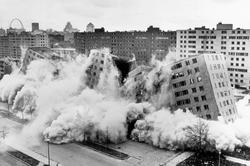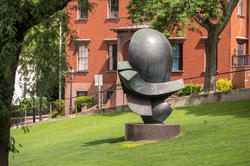The community comes together to celebrate President Crystal Williams with a two-day symposium, open studios, RISD Craft art sale and more.
Symposium Visualizes New Spaces

In early October, RISD celebrated the inauguration of President Crystal Williams with a two-day symposium exploring notions of space in the world of art and design that amplified the voices of faculty, staff, alumni and visiting scholars working in a wide array of disciplines.
Panelists considered questions of space from numerous angles. What role do the humanities, art and design play in shaping our understanding of the world? What can we learn from Indigenous peoples about coexisting with and stewarding the land on which we live? What responsibility do established institutions like universities and museums shoulder in moving beyond colonialism and creating space for non-white histories?


The symposium began with a panel discussion moderated by Williams and featuring high-profile alums Ilene Chaiken 79 GD, Michael Maltzan BArch 85 and Shahzia Sikander MFA 95 PR/PT, who shared their experiences in attempting to create new spaces within their fields. Sikander says she uses her work to challenge the status quo and push back against the narrow confines of who is “allowed to claim history.” And Chaiken noted that people from dominant cultures fear there is limited space at the table and that welcoming new perspectives will ultimately result in their expulsion. “In truth,” she said, “creating space for new voices creates even more space over time.”


As architectural historian and Associate Professor Ijlal Muzaffar pointed out in leading the panel On the Politics of Space, “the very way that spaces are designed—even this auditorium where we are gathered—determines who can enter, what they can say and what hierarchy exists among them.”
“The land itself is our original teacher, and Indigenous methodologies are good for all living things.”
Visiting designer and Yale University faculty member Mae-ling Lokko raised the issue of land ownership and the license it seemingly gives us to destroy what was here, rather than taking responsibility for its stewardship, a concept that came up in several other panels as well. As a participant in the panel On the Politics of Collecting and Display, Indigenous museum consultant endawnis Spears (Diné/Ojibwe/Chickasaw/Choctaw) questioned the very concept of land ownership and the settler view of humans as the central protagonists in the story of the Earth. “The land itself is our original teacher,” she noted. “And Indigenous methodologies are good for all living things.”

The discussion, co-led by RISD Museum Curator Kate Irvin and Apparel Design Department Head Lisa Z. Morgan, raised fundamental questions about the evolving practices of “capital-M Museums.” Irvin read the official definition of the word museum, which promotes such institutions as monuments to colonialism, and asked, “Can we consider this definition as a scaffolding or trellis for creating new spaces and breaking through traditional boundaries?”


In a separate conversation, On the Lands We Occupy, RISD alum and visiting artist Tanya Aguiñiga MFA 05 FD—whose work investigates the US-Mexican border, where she was born and raised—defined land as a bastion of safety and survival. “As a colonized people who were allowed to migrate for generations, we didn’t cross the border, the border crossed us,” she said. “Border issues have to do with people seeking safety… from climate change, violence against women and other universal problems.”
“Border issues have to do with people seeking safety… from climate change, violence against women and other universal problems.”
“My work is grounded in understanding the problems that marginalized communities are dealing with and amplifying their experiences so that those problems can be solved,” visiting designer and alumna Ashleigh Axios 08 GD said in Seeing and Unseeing, a panel led by Assistant Professor Derrick Woods-Morrow. Co-panelist Alisa Swindell, a curator at the Hood Museum at Dartmouth College, added that part of the role of the teacher is to “give students the ability to trust the knowledge they bring with them to the institution.”


Higher education leaders Frances Bronet (president of Pratt Institute), Christina H. Paxson (president of Brown University) and Renée T. White (provost at The New School for Social Research) explored such questions deeply in On the Place of Art, Design and the Humanities, a panel moderated by RISD Provost Anais Missakian 84 TX.
“Prospective students are looking for places where they can… examine questions from different vantage points and chart their own paths.”
“Prospective students are looking for places where they can… examine questions from different vantage points and chart their own paths,” White noted. “They’re asking a lot of important questions about the origins of our institutions and… rejecting anything tied to our colonial past in favor of focusing on the present. But history is important. The past helps you understand where you are and where you’re headed.”


Panelists of color participating in Narrating Across Media spoke to the idea of existing within mostly white, colonial institutions while at the same time attempting to subvert them. Comics artist Ben Passmore wondered “how we can stop valorizing the media in which we work and amplifying existing hierarchies.” And textiles artist and RISD alum Qualeasha Wood 19 PR built on those questions, asking, “How do we disrupt the spaces in which we work, thrive within them and still live our truth?”
“How do we disrupt the spaces in which we work, thrive within them and still live our truth?”
And, as panelists in Translating Across Space pointed out, it’s not only a question of dominant culture, but dominant language. “Americans and others in the dominant language group live in a bubble that impoverishes us,” said Booker Prize-winning translator Daisy Rockwell.

“The ability to make art is our superpower as human beings.”
Antiracist author Ibram X. Kendi
Crossing linguistic divides is one of the reasons art is so important, noted antiracist author Ibram X. Kendi in the closing conversation with President Williams. “The ability to make art is our superpower as human beings,” he declared. “Art opens people up in a way that political speeches don’t. It allows us to break through barriers, bring people together and help them to think differently.”
—Simone Solondz/symposium photos by Jo Sittenfeld MFA 08 PH and Matt Watson 09 FAV
See the complete list of symposium panels and participants.
October 18, 2022


